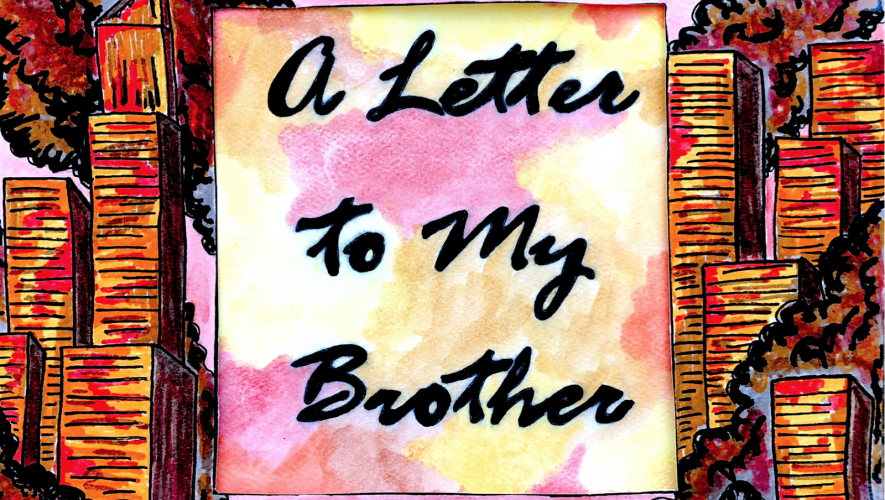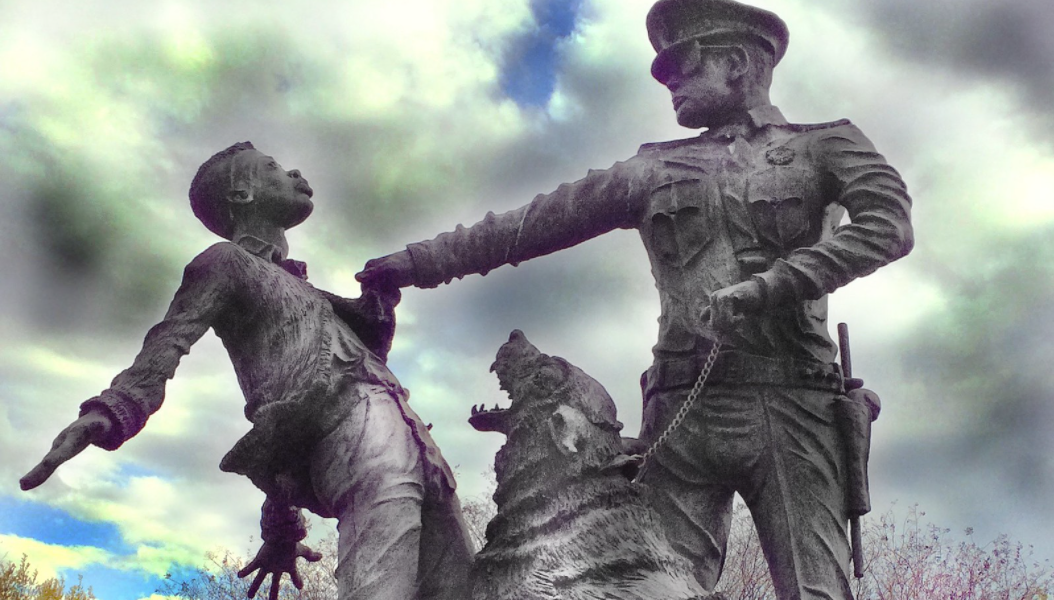Illustration by Emily Rubin (Business Administration 2022)
In 1965, African American author James Baldwin took part in a debate at Cambridge University against William F. Buckley, founder of National Review and staunch opponent of the Civil Rights movement. They discussed whether “the American Dream is at the expense of the American Negro.” I often come back to a rarely quoted line in Baldwin’s speech:
“By the time you are thirty, you have been through a certain kind of mill. And the most serious effect of the mill you’ve been through is, again, not the catalog of disaster, the policemen, the taxi drivers, the waiters, the landlady, the landlord, the banks, the insurance companies, the millions of details, twenty-four hours of every day, which spell out to you that you are a worthless human being. It is not that. It’s by that time that you’ve begun to see it happening in your daughter or your son, or your niece or your nephew.”
Like most Black Americans, I am not surprised by the grand jury’s decision to charge Officer Brett Hankison with wanton endangerment instead of the murder of Breonna Taylor—a decision that reminds us that Taylor’s life didn’t matter. Property matters, and perhaps her neighbors did too, but not her.
I am hurt, but not for myself. As Baldwin describes, my pain stems from coming to terms with the world you, my brother Markelle, will grow up in. You are seven years old, and the perverse effects of White supremacy in the classroom have already begun to influence your sense of self. I lament your upcoming reckoning with more overt injustices.
The days are not long until you are stopped for riding a bike in the “wrong” neighborhood or you are called “boy” when your age no longer warrants it. And eventually, you will sit in front of a television and witness another Black life taken, another miscarriage of justice.
I do not know how I will conduct myself that day to alleviate a wound that cuts deep into my heart. I know our parents will be equally powerless. We will have no authority to act, and that is precisely why the crime is so heinous; there is nothing that shatters the family more than a parent’s inability to protect their children. From the instant they enter the White world, Black children are victimized by psychic damage of inferiority, enforced by the daily injustices that speak to their expendability.
Consider the millions of Black girls whose coming-of-age story will include Kentucky Attorney General Daniel Cameron—one of the few faces in power who looks like them—explain that Breonna Taylor’s death was justified. They are Breonna Taylor. They will grow to expect the same fate.
Black children are shown that it’s not Taylor’s murder that’s unacceptable—it’s the sloppiness officers displayed in perpetrating it. Black Americans can be murdered, but the country would prefer it be done without property damage. Cameron’s narrative, fraught with half truths to cast blame on Taylor, places the utmost significance on property, finding a seat next to conservative Black economist Thomas Sowell’s defense of antebellum southern capitalism. He argued that capitalism incentivized masters to not maim slaves too severely, lest they permanently damage an asset.
Property damage has always been considered more important than Black lives. The only time Black lives have been valued by this country is when taking them constituted an infringement upon the property of a White man.
But property damage is permissible under one condition—if it shields police from accountability for the terror they inflict on the Black community. Hours before the grand jury’s ruling, Louisville declared a 9 p.m. curfew and the governor called in the National Guard. Within the first thirty-six hours after the ruling, over one hundred people were arrested. The city knew this would happen.
Though I reject the conservative condemnation of violence—which is entirely disingenuous—the suffering that comes from this violence truly saddens me. But this only illuminates the city’s adherence to a founding national principle—as N.W.A put it, “the authority to kill a minority.” The right of White Americans to enact violence upon Blacks must not be infringed.
I repeat, Louisville anticipated violence, but chose to brace for the storm. It could have prevented this suffering by bringing proper charges. However, the city chose to protect Taylor’s murderers, even though it meant businesses would be destroyed and people would get hurt during the ensuing protests. The curfew and lockdown exist to suppress dissent, not to prevent violence; this is why you see nonviolent protesters jailed while armed right-wing gangs rove the streets unimpeded. The city sees itself as a protector of White America’s fundamental freedom to destroy Black lives.
How does one explain to a child that—should they experience a tragedy—the justice systems they have learned to believe in will not aid them? There are no words that can soften the discovery that—should you be killed—the country will do everything in its power to discredit you, to assume that your death was warranted, to dismiss anything that favors you. Your skin color will be a stand-in for a guilty plea.
I don’t know how to explain to you, Markelle, the lengths Americans will go to defend the indefensible. You could be protecting your girlfriend from people knocking down your door in the middle of the night, as Kenneth Walker was. This country will implicate you. You could be enjoying ice cream as an off-duty cop bursts into your apartment, as Botham Jean was. This country will believe she rightfully feared for her life. You could be playing in a park, as I know you so love to do, with a toy virtually every teenage boy is taught to treasure, as Tamir Rice was. This country will paint you as dangerous. They’ll ascribe to you every bad intention possible, and remain ignorant to the inner dispositions that cause them to do so.
At the same time, those who claim to honor your name will become desensitized to your death. People will use it to craft empty gestures that don’t address their own prejudice, boosting their moral self-esteem in the process.
This has been Breonna Taylor’s fate.
Her name has been so thoroughly cleansed of humanity that it feels hollow. Those who invoked it grew desensitized to her murder and the suffering Black Americans endure.
Still, I grieve. For Breonna. For those who will inevitably suffer the same fate as her. For you, Markelle. And for the generations to come, whose moral lives will be “destroyed by the plague called color.”
I am certain that the daily slings and arrows that result from “racism,” a word that entails so much I am loath to use it, will continue. Despite my youth, my Black American bildungsroman—which demands a recognition of the terrible truths of this country—has already occurred.
I am not the first to find myself in this situation. Baldwin himself warned his nephew of America’s harsh realities in “My Dungeon Shook.” In Between the World and Me, Ta-Nehisi Coates had no words of comfort for his son after Michael Brown’s murderers went free. Instead, he told him “that this is your country, that this is your world, that this is your body, and you must find some way to live within the all of it.”
So Markelle, I’m sorry to write to you like this. I’m sorry your life has been inextricably linked to all the Black boys before you. I am filled with tears thinking of the day you come to see this, and the day you’ll see your children come to this revelation. I know that someday, you’ll find your head bowed like mine under the weight of it all.
I cannot tell you to lift it and forget. I can only implore you to carry on regardless.



